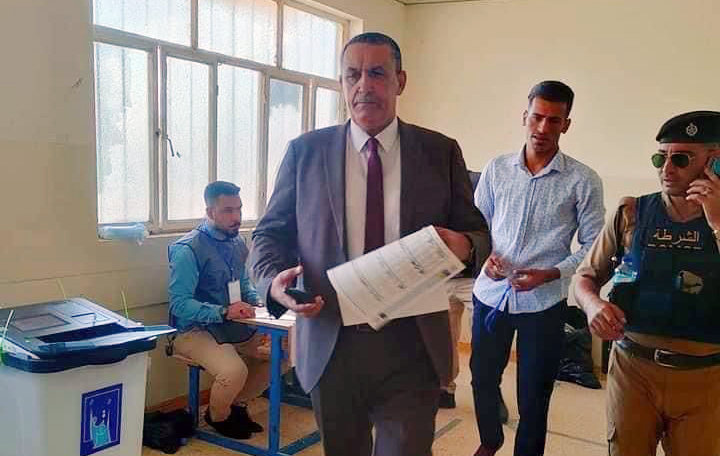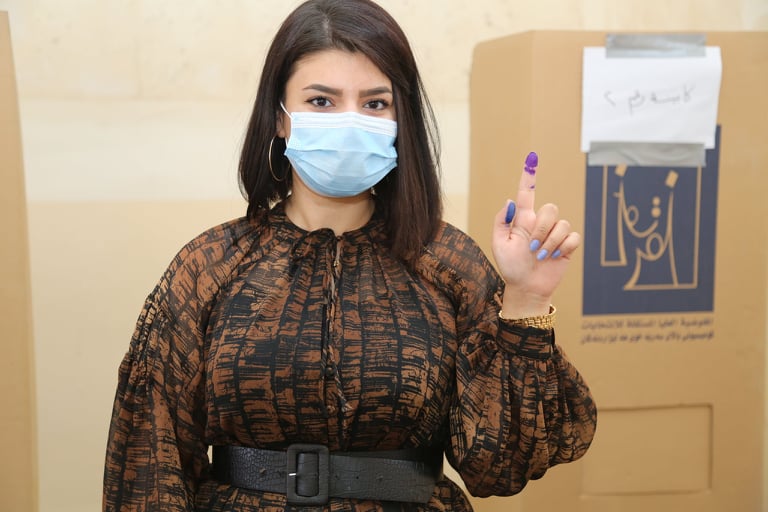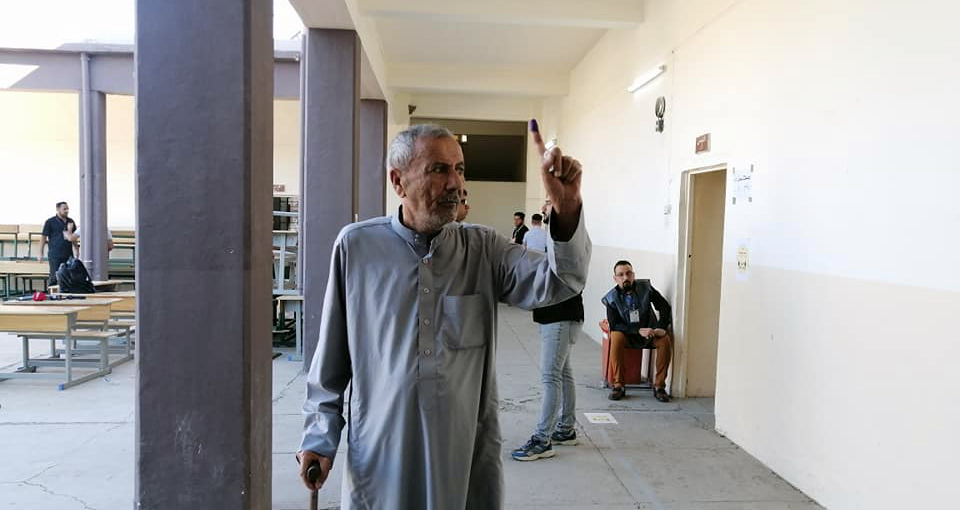Following the General Elections of October 10th, some candidates who got tens of votes only do still have the chance to occupy one of the 329 parliamentary seats in Baghdad in case some winners do not take oath and leave their positions unoccupied.
In the even if Rakan Saeed al-Jubouri, the current acting governor of Kirkuk, one of the winners of the Iraqi parliamentary elections in Kirkuk, does not take the oath as a new deputy, his brother will replace him in parliament, but if he takes the oath and then leaves his seat, he will be replaced by the losing candidate, Wasfi al-Asi al-Obeidi.
According to the Iraqi Parliament Elections Law, there are two mechanisms for filling vacant parliamentary seats, in the event that the winning candidate does not go to Parliament from the beginning or if he withdraws after taking the oath for any reason and leaves his seat vacant.
Paragraph fifth of Article 15 of the Elections Law states that “if any seat in the House of Representatives becomes vacant, the candidate who obtains the highest number of votes in the electoral district shall replace it.”
The ninth paragraph of Article 16 states that "If the vacant seat belongs to a woman, it is not required a woman necessarily to replace her unless that affects the percentage of women's representation quota."
Article 46 of the Elections Law addresses the second mechanism for filling vacant parliamentary seats, as it states, “The winning candidate in the parliamentary elections is obligated to take the constitutional oath within a maximum period of one month from the date of the first session, otherwise the replacement for him will be the one with the highest votes from the losing candidates from his list in the same constituency."
It also stated in the same article that “in the event that the oath is not taken by the individual candidate, the candidate who replaces him shall be the highest loser in his electoral district.”
Located 238 kilometers north of Baghdad, the oil-rich province of Kirkuk is an ethnically mixed province for 1.6 million Kurds, Arabs, and Turkmen, Muslims, Christians and Kaka'is. It has long been at the center of disputes between Baghdad and the Erbil.
The Kurds managed to get six seats compared to four for the Arabs and only two for the Turkmens, the Independent High Electoral Commission IHEC said on October 16th.

Kirkuk, October 10th 2021: Rakan al-Jubouri, governor of Kirkuk and candidate of the Arab coalition in Kirkuk, casting his vote in the parliamentary elections. Photo: Rakan al-Jubouri's Facebook page
The third constituency of Kirkuk
In the legislative elections that were held on October 10, 2021, Muhammad Tamim of the National Progress Alliance won 24,390 votes, followed by Rakan Saeed al-Jubouri of the Arab Alliance with 14,682 votes and Mona Muhammad al-Jubouri of the National Contract Alliance with 9,964 votes, which won the women’s quota seat.
Under the electoral law, if Muhammad Tamim does not take the constitutional oath, he will be replaced by Sahira Abdullah al-Jubouri, who gathered 8,010 votes for the same coalition in the same constituency, but if Muhammad Tamim’s seat becomes vacant after taking the oath, then his replacement will be Wasfi al-Asi al-Obeidi, the losing candidate with the highest votes for the United Arab Front UAF list in the same electoral district, after collecting 11,129 votes.
In the event that Rakan al-Jubouri wants to remain in the position of governor and not go to Parliament, then his brother, Sahmi Saeed al-Jubouri, who won only 87 votes for the same coalition and in the same constituency, will replace him.
Although Rakan al-Jubouri won the votes needed to win a parliamentary seat in the 2018 elections, he did not take the oath and remained in his position as the governor of Kirkuk.
As for the winning candidate for the women's quota seat in the third electoral district, Mona Muhammad al-Jubouri, whenever her seat becomes vacant, she will be replaced by the losing candidate with the highest votes, Sahira Abdullah al-Jubouri.
Only 440,000 Kirkukis, about 44%, of more than one million people eligible to vote, cast ballots for 12 seats in the Iraqi parliament, three of it for women plus a seat for the Christian community.
Several Arab candidates were registered for the mainly Kurd inhabited first electoral district, which included east and north of Kirkuk, for which five seats have been allocated by the Independent High Electoral Commission IHEC,
The same was true for the second electoral district which was a mixed part of Kirkuk, for Turkmens, Kurds and Arabs. The district for which four seats have been allocated covered Daquq district and several neighborhoods of Kirkuk.
The third and smallest district of Kirkuk had three seats, out of which one seat was for women candidate pew quota of the new electoral system. The district covered mainly Arab inhabited district of Hawija and the sub-districts of Abbasi, Zab, Rashad and Taza.
The second constituency
According to the election results, Arshad al-Salihi from the United Iraqi Turkmen Front coalition won 23,060 votes while Gaylan Qadir from the Kurdistan Alliance with 13,239 votes, Najwa Hamid al-Kakai candidate of Kurdistan Democratic Party KDP with 11,887 votes and Sawsan Abdul Wahed from the United Iraq Turkmen Front with 7,731 votes.
In the event that Arshad al-Salihi’s seat becomes vacant after he was sworn in, his replacement will be Gharib Askar Naqi for the pro-Iran Fatih Alliance led by Hadi al-Amiri with 7,729 votes, but if al-Salihi does not go to Parliament from the beginning, he will be replaced by Ammar Hedayat, who won 6,243 votes on the same list and in the same constituency.
If Gaylan Qadir’s seat becomes vacant after taking the oath, his replacement will be Gharib Askar as the losing candidate with the highest votes in the second electoral district, but if he is sworn in, his seat will go to Kurdistan Alliance candidate Ashti Mahdi, who won 1,716 votes.
Since Najwa Hamid al-Kaka'i was the only candidate for the Kurdistan Democratic Party in the second district, if her seat becomes vacant for any reason, Gharib Askar will replace her, but if her seat becomes vacant, the only winning female candidate in that district will be Khadija Ali Turkmani, the independent candidate who collected 2433 votes.
With regard to the winning candidate, Sawsan Abdel Wahed, if her seat becomes vacant after taking the oath, she will be replaced by Gharib Askar, but if she does not take the oath, then her seat will go to Ammar Kahia on the same list, but if her seat becomes vacant, the only winning female candidate in that constituency, then she will be replaced by the independent candidate Khadija Turkmani.

Kirkuk, October 10th 2021: A female voter casts her vote at a polling station in the city of Kirkuk for the Iraqi Parliament elections. Kirkuk Now
First constituency
The winners for this constituency are Shakhwan Abdullah, candidate of KDP, with 37,744 votes, then Omid Muhammad from the New Generation Movement with 23,090 votes, the independent candidate Dylan Ghafoor with 21,510 votes, Sabah Habib from the Kurdistan Alliance with 15,708 votes and the independent candidate Muhaimin Ali Al-Hamdani with 14,358 votes.
All of these candidates, except for Dylan Ghafoor, will be replaced by Muayyad Ghazi from the Kurdistan Alliance with 11,348 votes, if they do not take the constitutional oath in Parliament as the losing candidate with the highest votes in that constituency, because the parties for which Shakhwan Abdullah and Omid Muhammad are running do not have other candidates In that constituency. Muhaimin Al-Hamdani is an independent candidate.
With regard to Dylan Ghafoor, being the only winning woman in that constituency, if her seat becomes vacant, her replacement candidate for the Kurdistan Alliance will be Alla Talabani, with 9,058 votes.
According to the Iraqi constitution, after the approval of the final results of the parliamentary elections by the Federal Court, the President of the Republic will invite the elected members of Parliament to hold the first session of Parliament within 15 days. However, the IHEC has not yet announced the final results of the elections in preparation for its approval by the Federal Court.





